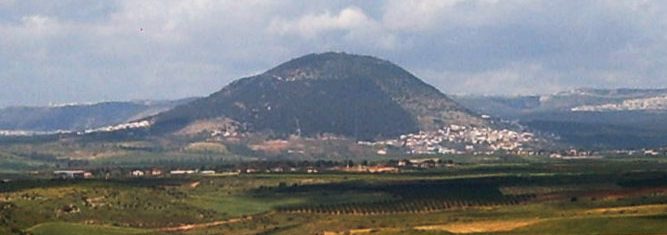We read two songs last week. The first was sung by all of the Jewish people on the banks of the Yam Suf; the second was sung two hundred years later by Devorah and Barak at the top of Mount Tavor in Israel.
Har Tavor is one of the highest mountains in the Middle East and it was one of the front runners as the site of the giving of the Torah. In the end, G-d chose Har Sinai and the Torah was given on her although she was not the tallest and not the widest and not the most beautiful. The Medrash tells us that Mount Tavor was given a consolation prize: One day Devorah would sing her song on Har Tavor. Further, the Pesikta writes that the Third temple will, in some way be built on Har Tavor.
Mount Tavor is cited throughout scripture as a tall and majestic mountain. Naftali was praised for owning this piece of Real Estate; Zevulun complained that he had nothing like Har Tavor in his portion of Israel. It is a beautiful piece of our Holy Land. It was also a very strategic mountain in wars that took place throughout history from the Romans through the crusades. It was the location of one of the bonfires that were lit to let people know the date of Rosh Chodesh. But what is the particular connection between Mount Tavor and the song of the sea and the giving of the Torah on Mount Sinai?
I think the answer can be seen in Devora’s song. Devora began her song by pointing out that the Jewish people had wandered a little too far from Har Sinai. No longer were they a humble nation that had just a few weeks ago been slaves and a people that had nothing to lose. Now they were a people with territories and victories and a seat in the UN. Devorah criticized some of the tribes for being more concerned about their own territories than about the entire people of Israel. She criticized them for getting involved with and influenced by the local religions.
Devorah’s message to the people in leading the charge on Har Tavor and the song afterwards was that the Land of Israel was no different. True, Hashem chose to give the Torah on a mountain that was humble and plain and in the middle of a desert, but the same Torah exists on the beautiful, tall, and strategic Har Tavor. We are just as bound to Hashem’s word and just as dependent on His blessing.
This is an important lesson. We learn Torah, we keep Torah, and we sacrifice for Torah when it is our lifeline and the shining light in our lives. But what happens when our lives get more complicated, busier, and more expensive? Devorah taught us that the same Torah exists.
This is true for the Jewish People as well. We don’t grow out of the Torah. The same Torah who’s survival we fought for after World War II tells us to continue to cherish each soul today. The same Torah that inspired us to found schools decades ago also tells us to support them today, the same Torah that makes us feel responsible for making sure that there is a minyan in shul, also tells us to be there when we “aren’t needed”, and the same Torah that taught us so much when we were younger has something new to say to us every in every decade.
Just as we sang when crossed the Yam Suf to accept the Torah at humble Har Sinai, we will continue sing as we turn to Hashem and His Torah in every stage and every phase of our lives.


Very, very beautiful. One question: “…has something new to say to us every (sic) in every decade.” Isn’t it that Torah in fact carries messages and injunctions that are timeless yet storied, and really not new? We apply it to our new situations, but what the Torah is telling us is not ever new, but quite “old”!